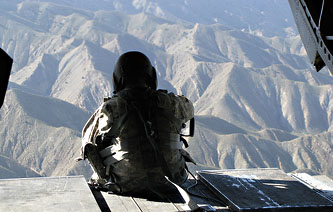 The Washington Post has a big story today about Matthew Hoh, a former Marine who served in Iraq and then joined the Foreign Service earlier this year to work in Afghanistan. He resigned last month after becoming disillusioned with the war.
The Washington Post has a big story today about Matthew Hoh, a former Marine who served in Iraq and then joined the Foreign Service earlier this year to work in Afghanistan. He resigned last month after becoming disillusioned with the war.
First off, here’s the basic timeline of Hoh’s service:
He arrived in Zabul following two months in a civilian staff job at the military brigade headquarters in Jalalabad, in eastern Afghanistan. It was in Jalalabad that his doubts started to form….By the time Hoh arrived at the U.S. military-run provincial reconstruction team (PRT) in the Zabul capital of Qalat [in July], he said, “I already had a lot of frustration. But I knew at that point, the new administration was . . . going to do things differently. So I thought I’d give it another chance.”
I confess that this makes me a little skeptical about the whole story. Hoh “already had a lot of frustration” after two months? And he quit two months after that? Unless Hoh is the fastest learner on the planet, that really doesn’t seem like enough time to get very far up the learning curve.
Still, everybody the Post talked to has a ton of respect for the guy, and his critique is pretty simple and specific:
Hoh was assigned to research the response to a question asked by Adm. Mike Mullen, chairman of the Joint Chiefs of Staff, during an April visit. Mullen wanted to know why the U.S. military had been operating for years in the Korengal Valley, an isolated spot near Afghanistan’s eastern border with Pakistan where a number of Americans had been killed. Hoh concluded that there was no good reason. The people of Korengal didn’t want them; the insurgency appeared to have arrived in strength only after the Americans did, and the battle between the two forces had achieved only a bloody stalemate.
Korengal and other areas, he said, taught him “how localized the insurgency was. I didn’t realize that a group in this valley here has no connection with an insurgent group two kilometers away.” Hundreds, maybe thousands, of groups across Afghanistan, he decided, had few ideological ties to the Taliban but took its money to fight the foreign intruders and maintain their own local power bases.
“That’s really what kind of shook me,” he said. “I thought it was more nationalistic. But it’s localism. I would call it valley-ism.”
Hmmm. Afghanistan was a tribal region in the 90s too, but the Taliban still managed to take over a pretty big chunk of the country and provide al-Qaeda with an operating base. Valleyism won’t necessarily keep that from happening again.
Still, Hoh’s evaluation is pretty orthodox. I basically think he’s right, and apparently so does Richard Holbrooke, who told the Post, “I agreed with much of his analysis.” What’s less clear is what he thinks we ought to do about it. So I’d be interested in hearing more from serious Afghanistan bloggers and analysts: Is Hoh right? And if so, what’s the answer?








